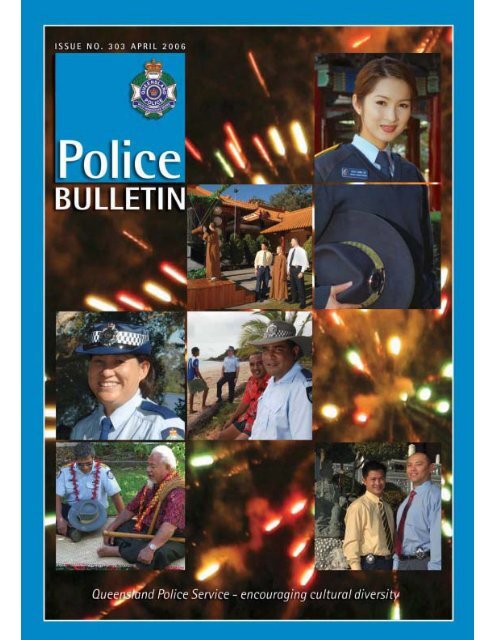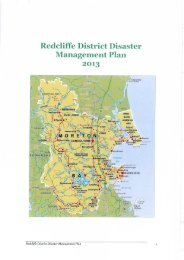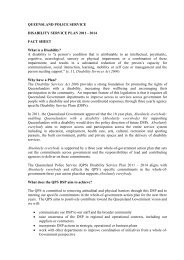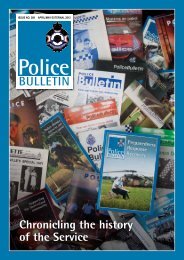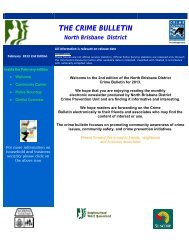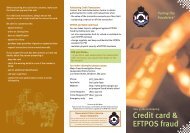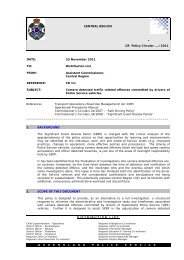Enhancing effective relationships - Queensland Police Service
Enhancing effective relationships - Queensland Police Service
Enhancing effective relationships - Queensland Police Service
You also want an ePaper? Increase the reach of your titles
YUMPU automatically turns print PDFs into web optimized ePapers that Google loves.
FROM COMMISSIONER ATKINSON<br />
<strong>Enhancing</strong> <strong>effective</strong> <strong>relationships</strong><br />
The <strong>Queensland</strong> <strong>Police</strong> <strong>Service</strong><br />
(QPS) is dedicated to enhancing<br />
<strong>effective</strong> <strong>relationships</strong> within<br />
culturally diverse communities<br />
throughout <strong>Queensland</strong>.<br />
We as a police service are<br />
committed to policing in diverse<br />
communities and environments,<br />
promoting <strong>effective</strong> <strong>relationships</strong><br />
based on inclusiveness, open<br />
communication, mutual<br />
understanding, respect and trust.<br />
This issue of the <strong>Police</strong> Bulletin<br />
focuses on a number of QPS<br />
initiatives aimed at developing and<br />
maintaining <strong>effective</strong> <strong>relationships</strong><br />
with Indigenous and ethnic<br />
communities.<br />
Travel to China<br />
Recently I was fortunate enough to<br />
be able to travel to China with<br />
Inspector Mark Plath and Senior<br />
Sergeant Daniel Bragg from the<br />
Leadership and Management<br />
Development Unit, Human<br />
Resource Development Branch.<br />
The purpose of the visit was to<br />
strengthen the existing<br />
<strong>relationships</strong> with policing<br />
agencies in Hong Kong,<br />
Guangdong and Shanghai.<br />
Those <strong>relationships</strong> have<br />
developed through the attendance<br />
of representatives of those three<br />
police agencies at the three-week<br />
Management Development<br />
Program, a residential program<br />
held at the <strong>Queensland</strong> <strong>Police</strong><br />
<strong>Service</strong> Academy in Oxley.<br />
Inspector Plath and Senior<br />
Sergeant Bragg continued on after<br />
I returned to Australia to hold<br />
negotiations in Beijing and Macau<br />
for the potential future involvement<br />
of police officers from those cities.<br />
Since 2002, police officers from<br />
across the Asia Pacific Region<br />
have attended the three-week<br />
residential component of the<br />
Management Development<br />
Program.<br />
The inclusion of external police in<br />
the program, funded by their own<br />
organisations, allows the<br />
development of strong crossagency<br />
<strong>relationships</strong> and<br />
enhances the opportunities for<br />
information sharing and<br />
networking.<br />
Apart from the benefits already<br />
mentioned, the inclusion of<br />
external police in the program also<br />
provides an opportunity for the<br />
re-investment of tuition fees into<br />
improvements in the program that<br />
benefits our members, who are<br />
destined to be our future senior<br />
managers.<br />
New stations and PCYC<br />
Last month I was able, along with<br />
Sport and Recreation Minister Tom<br />
Barton, to attend the Goondiwindi<br />
Indoor Sports Centre opening<br />
celebrations.<br />
Minister Barton was asked to<br />
officially open the complex, which<br />
includes the Goondiwindi <strong>Police</strong>-<br />
Citizens Youth Club and provides a<br />
modern facility which offers a<br />
range of activities for the local<br />
community.<br />
This was only one of a number of<br />
new facilities that were opened<br />
recently. Others included new<br />
stations at Tin Can Bay, Sarina<br />
and Mackay Northern Beaches,<br />
along with a police beat at<br />
Seaforth in the Mackay District.<br />
The <strong>Police</strong> <strong>Service</strong> is also<br />
undertaking a number of<br />
refurbishments to existing stations<br />
across the state and exploring the<br />
purchase or lease of other new<br />
facilities.<br />
Mornington Island visit<br />
Recently I visited Mornington<br />
Island as part my government<br />
appointed role as Community<br />
Champion.<br />
An article in this issue outlines the<br />
visit and the meetings we were<br />
able to have with members of the<br />
community to discuss local issues<br />
of concern.<br />
The article (on page 22) also<br />
highlights the excellent work being<br />
undertaken by members of the<br />
QPS to support the community in<br />
this remote part of our state.<br />
That work is being replicated in<br />
many other Indigenous<br />
communities in <strong>Queensland</strong>, often<br />
under challenging and arduous<br />
circumstances, and my thanks to<br />
all involved for their effort, work<br />
and contribution in this regard.<br />
<strong>Police</strong>Bulletin303 03
QUEENSLAND POLICE SERVICE<br />
working together<br />
Executive Editor<br />
Leon Bedington<br />
Editor<br />
Simon Kelly<br />
Statement of purpose<br />
<strong>Police</strong> Bulletin is a free bi-annual<br />
public information document intended<br />
to provide a record of initiatives and<br />
achievements, an insight into the<br />
operations of the <strong>Queensland</strong> <strong>Police</strong><br />
<strong>Service</strong> and base research to<br />
interested members of the community.<br />
Each edition is available from police<br />
stations, district and regional offices,<br />
and <strong>Police</strong> Headquarters, Brisbane.<br />
Photography<br />
Unless otherwise indicated<br />
photographs throughout this<br />
publication were provided through the<br />
associated branch or unit, or taken by<br />
the following members: Sergeant<br />
Murray Latter and Senior Constable<br />
Deon Williams from the QPS<br />
Photographic Section; Inspector John<br />
Fox from the QPS Cultural Advisory<br />
Unit; Plain Clothes Sergeant Julie<br />
Stone from the Asian Specialist Unit;<br />
Senior Constable Maria Redenius from<br />
Oxley Scenes of Crime; Simon Kelly,<br />
Jacqui McClure, Sonia Giovannetti and<br />
Penny Doust from the QPS Media and<br />
Public Affairs Branch.<br />
<strong>Police</strong> Bulletin is printed externally by<br />
McDonald Printing Group.<br />
Media and Public Affairs Branch<br />
<strong>Police</strong> Headquarters<br />
GPO Box 1440<br />
Brisbane Qld 4001<br />
Telephone: (07) 3364 6256<br />
Facsimile: (07) 3364 6268<br />
Layout and design<br />
Diana Zivkovic,<br />
Graphic Designer,<br />
Graphic Design <strong>Service</strong>s<br />
Copyright of this publication is<br />
vested in the Commissioner of <strong>Police</strong>.<br />
Reproduction for use other than<br />
within the <strong>Queensland</strong> <strong>Police</strong> <strong>Service</strong><br />
is prohibited and requires the written<br />
permission of the Commissioner of<br />
<strong>Police</strong> (or his delegate) prior to<br />
re-publication or attribution.<br />
Contact should be made through<br />
the Director, Media and Public<br />
Affairs Branch.<br />
04 <strong>Police</strong>Bulletin303
ENCOURAGING CULTURAL DIVERSITY<br />
working together<br />
C O N T E N T S<br />
Message from Commissioner Atkinson . . . . . . . . . . . . . . . . . . . . . .3<br />
Message from Deputy Commissioner Conder . . . . . . . . . . . . . . . . .6<br />
Cultural Advisory Unit . . . . . . . . . . . . . . . . . . . . . . . . . . . . . . . . . .7<br />
<strong>Police</strong> Liaison Officers . . . . . . . . . . . . . . . . . . . . . . . . . . . . . . . . . .8<br />
Asian Specialist Unit . . . . . . . . . . . . . . . . . . . . . . . . . . . . . . . . . .18<br />
Commissioner Community Champion of Mornington Island . . . . . .22<br />
Homelands Partnerships . . . . . . . . . . . . . . . . . . . . . . . . . . . . . . .24<br />
PCYC CAPE program . . . . . . . . . . . . . . . . . . . . . . . . . . . . . . . . . .26<br />
Officer teaches Maori culture at detention centre . . . . . . . . . . . . .28<br />
Justice Entry Program graduation . . . . . . . . . . . . . . . . . . . . . . . . .30<br />
Officer awarded for services to multiculturalism . . . . . . . . . . . . . .32<br />
Edinburgh Military Tattoo . . . . . . . . . . . . . . . . . . . . . . . . . . . . . . .34<br />
Beat the Streets project . . . . . . . . . . . . . . . . . . . . . . . . . . . . . . . .36<br />
National <strong>Police</strong> Memorial . . . . . . . . . . . . . . . . . . . . . . . . . . . . . . .38<br />
A D V E R T I S E R S I N D E X<br />
. . . . . . . . . . . . . . . . . . . . . . . . . . . . . . . . . . . . . . . . . . . . . . . . . . .2<br />
. . . . . . . . . . . . . . . . . . . . . . . . . . . . . . . . . . . . . . . . . . . . . . . . . .11<br />
. . . . . . . . . . . . . . . . . . . . . . . . . . . . . . . . . . . . . . . . . . . . . . . . . .17<br />
. . . . . . . . . . . . . . . . . . . . . . . . . . . . . . . . . . . . . . . . . . . . . . . . . .23<br />
. . . . . . . . . . . . . . . . . . . . . . . . . . . . . . . . . . . . . . . . . . . . . . . . . .31<br />
. . . . . . . . . . . . . . . . . . . . . . . . . . . . . . . . . . . . . . . . . . . . . . . . . .35<br />
. . . . . . . . . . . . . . . . . . . . . . . . . . . . . . . . . . . . . . . . . . . . . . . . . .39<br />
. . . . . . . . . . . . . . . . . . . . . . . . . . . . . . . . . . . . . . . . . . . . . . . . . .40<br />
<strong>Police</strong>Bulletin303 05
FROM DEPUTY COMMISSIONER CONDER<br />
<strong>Queensland</strong> Aboriginal and<br />
Torres Strait Islander <strong>Police</strong> (QATSIP)<br />
The <strong>Queensland</strong> <strong>Police</strong> <strong>Service</strong><br />
(QPS) has been trialling the<br />
<strong>Queensland</strong> Aboriginal and Torres<br />
Strait Islander <strong>Police</strong> (QATSIP)<br />
concept in three Indigenous<br />
communities since 2000.<br />
The project involves the QPS,<br />
through the QATSIP program,<br />
taking responsibility for all policing<br />
roles in individual Aboriginal and<br />
Torres Strait Islander<br />
communities.<br />
Currently, the function is shared<br />
between the QPS, and the local<br />
council (through Community<br />
<strong>Police</strong>) using local law and order<br />
by-laws.<br />
The project has seen the transfer<br />
of the community policing function<br />
from local councils at Woorabinda,<br />
Yarrabah and Badu Island to<br />
the QPS.<br />
It is based on a belief in the value<br />
of working in partnership with<br />
Indigenous communities to deliver<br />
an <strong>effective</strong> policing service.<br />
The project was extensively<br />
evaluated in 2003, finding that the<br />
trial had been successful and<br />
resulting in the project concept<br />
being formalised into a recognised<br />
program. The program now<br />
receives continual funding.<br />
I am grateful for the work of the<br />
QATSIP officers who have<br />
contributed to and supported the<br />
program throughout that time.<br />
Recently, Senior Sergeant Matt<br />
Orme and Sergeant Brendon<br />
McMahon, from Far Northern<br />
<strong>Police</strong> Region, in conjunction with<br />
Human Resources Development<br />
Branch developed a Law and<br />
Order By-Laws Training Course.<br />
The course is designed to provide<br />
the necessary knowledge and<br />
skills to enable QATSIP officers<br />
to examine, understand and<br />
interpret law.<br />
The course explains, in detail,<br />
relevant by-law offences as well as<br />
the powers available to them in<br />
exercising their duties.<br />
The course also includes a police<br />
operational skills training<br />
component to assist QATSIP<br />
officers to use their powers in<br />
the field.<br />
It is intended that the course will<br />
be delivered to QATSIPs in the<br />
near future, and it will also be of<br />
great interest to state police<br />
working on Indigenous<br />
communities as they share the<br />
same by-law powers as the<br />
Community <strong>Police</strong>.<br />
The issue of the roles and<br />
responsibilities of policing<br />
functions on Aboriginal and Torres<br />
Strait Islander Communities is<br />
under review by a Law and Justice<br />
Chief Executive Officers’<br />
Committee project, the Policing<br />
Indigenous Communities Project.<br />
The project, which is expected to<br />
be finalised by 2007, will examine<br />
all aspects of policing in remote<br />
communities and aims to identify<br />
a preferred model for the future<br />
policing of Indigenous<br />
communities.<br />
I believe the result of this review<br />
will ultimately lead to an enhanced<br />
policing presence in remote<br />
communities.<br />
06 <strong>Police</strong>Bulletin303
Understanding, respect, tolerance and<br />
trust: basis for multicultural<br />
<strong>relationships</strong><br />
Badu Island QATSIP Solomon Ahmat (right) with Thursday Island staff member Peo Ahmat (second from right). Naseli Tamwoy and Senior Constable Christopher Lee<br />
are in the background.<br />
As our multicultural society<br />
continues to grow, so too does the<br />
<strong>Queensland</strong> <strong>Police</strong> <strong>Service</strong> (QPS)<br />
commitment to developing and<br />
maintaining <strong>effective</strong> <strong>relationships</strong><br />
with Indigenous and ethnic<br />
communities.<br />
This is the mission of the QPS<br />
Cultural Advisory Unit (CAU),<br />
which forms part of the Office of<br />
the Commissioner.<br />
It also promotes understanding<br />
within the QPS about cultural<br />
diversity with input into<br />
recruitment, education, training,<br />
policy development and police<br />
procedures.<br />
Inspector John Fox, Officer in<br />
Charge of the CAU, said the unit’s<br />
foundation for building<br />
<strong>relationships</strong> was based on open<br />
communication, understanding,<br />
respect, tolerance and trust.<br />
“Its objectives include ensuring<br />
QPS policies and programs are<br />
culturally appropriate and<br />
equitable, and identifying and<br />
providing advice on trends and<br />
emerging issues of concern to<br />
police, ethnic and Indigenous<br />
communities.<br />
“The CAU oversees such<br />
programs as the <strong>Police</strong> Liaison<br />
Officer scheme, <strong>Queensland</strong><br />
Aboriginal and Torres Strait<br />
Islander <strong>Police</strong> (QATSIP) program<br />
and the Cross Cultural Liaison<br />
Officer scheme, all of which help<br />
forge stronger ties between police,<br />
ethnic and Indigenous<br />
communities,” Inspector Fox said.<br />
The unit is based in Brisbane with<br />
one officer also in Cairns, and it is<br />
made up of police officers and<br />
staff members with a broad range<br />
of experience. This includes<br />
specialists such as Emmanuel<br />
Anthony, Senior Advisor to the<br />
Commissioner on ethnic issues<br />
and Bill Ivinson, Policy and Liaison<br />
Officer for Indigenous issues.<br />
“All officers work on developing<br />
and maintaining close links with<br />
peak multicultural and Indigenous<br />
groups at state and national level,<br />
government and non-government<br />
organisations and other police<br />
services,” Inspector Fox said.<br />
The unit is responsible for the<br />
strategic directions for policing<br />
Indigenous and ethnic<br />
communities.<br />
It also oversees the<br />
implementation of reviews,<br />
reports, policy documents and<br />
related ethnic and Indigenous<br />
issues including the Royal<br />
Commission into Aboriginal<br />
Deaths in Custody and the<br />
Aboriginal and Torres Strait<br />
Islander Women's Task Force<br />
on Violence.<br />
<strong>Police</strong>Bulletin303 07
What is<br />
a PLO?<br />
<strong>Police</strong> Liaison Officers (PLOs) are employed by the <strong>Queensland</strong> <strong>Police</strong><br />
<strong>Service</strong> (QPS) to establish and maintain a positive rapport between<br />
Indigenous and multicultural communities and police.<br />
Their role is to promote trust<br />
and understanding by helping the<br />
community and police to:<br />
• reduce and prevent crime<br />
• divert Indigenous and ethnic<br />
people from the criminal<br />
justice system<br />
• advise and inform police<br />
officers on such things as<br />
cultural customs, traditions<br />
and languages<br />
• improve community knowledge<br />
about policing services and<br />
issues of law and order.<br />
They do not have the powers of<br />
a police officer and, despite<br />
wearing the same blue uniform,<br />
are recognisable by their yellow<br />
shoulder epaulettes and the<br />
“<strong>Police</strong> Liaison Officer” badge<br />
on their hats. This differs in the<br />
Torres Strait where the shoulder<br />
epaulettes are blue/green.<br />
The concept of PLOs was initiated<br />
in north <strong>Queensland</strong> and expanded<br />
in response to the<br />
recommendations of the Royal<br />
Commission into Aboriginal Deaths<br />
in Custody.<br />
Initial successes led to an<br />
expansion to the rest of the state.<br />
There are currently 140 positions<br />
for PLOs with approximately 85% of<br />
them having links to the Aboriginal<br />
and Torres Strait Islander<br />
community. Others have links with<br />
the Chinese, Vietnamese, Pacific<br />
Islander, Australian South Sea<br />
Islander, Sudanese, South<br />
American, Filipino, Eastern<br />
European, Fijian Indian and Arabic<br />
speaking communities.<br />
For further enquiries regarding<br />
the PLO scheme, contact can be<br />
made with local PLOs or the<br />
QPS Cultural Advisory Unit<br />
on 3364 3934.<br />
08 <strong>Police</strong>Bulletin303
<strong>Police</strong> Liaison Officers (PLO)<br />
Johnathan Thurston on the<br />
attack for the North <strong>Queensland</strong><br />
Cowboys, and (below left) his<br />
mother PLO Debbie Saunders.<br />
Photo by David Kapernick, courtesy of The Courier-Mail<br />
League of<br />
their own<br />
By Simon Kelly, Media and<br />
Public Affairs Branch<br />
Debbie Saunders, Roy<br />
Hodges and Malcolm Doyle might<br />
not be household sporting names,<br />
but their sons are.<br />
One is mother to reigning National<br />
Rugby League (NRL) player of the<br />
year Johnathan Thurston while the<br />
others are fathers of State of<br />
Origin representatives Justin<br />
Hodges and John Doyle.<br />
Also forging the <strong>Queensland</strong> <strong>Police</strong><br />
<strong>Service</strong> (QPS) link between the<br />
Indigenous community and elite<br />
rugby league is PLO Willie<br />
Morganson and former PLO and<br />
current police recruit John<br />
Buttigieg.<br />
Sitting in the Brisbane City <strong>Police</strong><br />
Beat, PLO Saunders is a world<br />
away from her son – a rising star<br />
with last season’s grand finalists<br />
the North <strong>Queensland</strong> Cowboys<br />
and three-time <strong>Queensland</strong> State<br />
of Origin representative.<br />
She is proud of her work with the<br />
QPS, particularly an initiative to<br />
divert youths away from chroming<br />
in the city.<br />
But her eyes light up even more<br />
when talk turns to Thurston’s<br />
2005 Dally M Medal, awarded to<br />
the NRL’s best player each year.<br />
“I was very humbled to be<br />
honest,” she said.<br />
“I was just over the moon when<br />
he won it – I couldn’t believe it.<br />
He deserves it … he gives 110%<br />
when he’s on the football field.”<br />
PLO Saunders has worked<br />
predominantly in Brisbane City<br />
since taking on the role in 1995.<br />
“Most of the kids I deal with<br />
(through patrols and diversion<br />
away from chroming) have found a<br />
healthy respect for police,”<br />
she said.<br />
“Building bridges and knocking<br />
down walls – I like to think I’ve<br />
done that through my role.”<br />
PLO Hodges has also noticed a<br />
significant improvement in the<br />
<strong>Police</strong>Bulletin303 09
It took PLO Hodges two years to<br />
win his trust, but the boy<br />
eventually turned his life around<br />
and later approached him for a job<br />
reference. The boy won the<br />
position and went on to<br />
successfully complete his<br />
apprenticeship.<br />
PLO Hodges moved from Cairns to<br />
Brisbane in 1999 to help his son<br />
adjust to life with the Brisbane<br />
Broncos.<br />
Having played rugby league in<br />
Cairns for 33 years, he also<br />
coached Justin from a young age.<br />
“Our family units are very closeknit.<br />
When someone has to leave<br />
it’s very hard,” PLO Hodges said.<br />
Justin is now a regular with the<br />
Broncos and has played three<br />
State of Origin games for<br />
<strong>Queensland</strong>.<br />
Justin Hodges breaking a tackle while playing for the Brisbane Broncos, and (left) his<br />
father PLO Roy Hodges.<br />
relationship between the QPS and<br />
<strong>Queensland</strong>’s Indigenous<br />
community since he joined the<br />
<strong>Service</strong> in 1993.<br />
Now stationed at the Chermside<br />
<strong>Police</strong> Beat in Brisbane’s north, he<br />
began his career as a PLO in<br />
Cairns.<br />
Photo by David Kapernick, courtesy of The Courier-Mail<br />
“In that time police liaison work<br />
has made quite a difference,” he<br />
said. “It has made a difference,<br />
getting out in the community.”<br />
One of his success stories was a<br />
young offender he tried to help<br />
avoid a life of crime.<br />
“It’s a great feeling to be part of<br />
the QPS and to have so many<br />
people in the job who support me<br />
and my young bloke,” PLO Hodges<br />
said.<br />
“There could be no father prouder<br />
than I am now.”<br />
PLO Doyle has gone from<br />
coaching his son to watching his<br />
career develop from afar.<br />
His son John is playing for the<br />
Sydney Roosters this year after a<br />
three-year break from the NRL.<br />
John started his career with the<br />
Cowboys in 1996 and played three<br />
State of Origin games for<br />
<strong>Queensland</strong> in 2001-02 before<br />
being forced out with injury. He<br />
has also played for the Australian<br />
Aboriginal side.<br />
“I sat him on the bench a couple<br />
of times because he didn’t turn<br />
up to training,” PLO Doyle said of<br />
coaching John’s North<br />
Rockhampton State High School<br />
side.<br />
10 <strong>Police</strong>Bulletin303
PLO Willie Morganson in his playing days.<br />
Photo courtesy of The Courier-Mail<br />
Above: John Buttigieg charges into attack for the North <strong>Queensland</strong> Cowboys before starting a career with the QPS.<br />
Below: Former Cowboy John Doyle, son of PLO Malcolm Doyle.<br />
“The other kids weren’t happy<br />
because he was the main man but<br />
it was a matter of principle.”<br />
While PLO Doyle no longer<br />
coaches, he still does a lot of work<br />
with local children, particularly<br />
during school visits.<br />
He expected becoming a PLO<br />
would not be a popular decision.<br />
“But kids have started coming up<br />
to me and saying they want to be<br />
PLOs so that’s a positive,” he said.<br />
PLO Morganson particularly enjoys<br />
interacting with children as part of<br />
QPS visits to schools in an around<br />
Ingham where he is stationed.<br />
He became a PLO in 1999 after<br />
returning from a stint in the<br />
English Super League. Plenty of<br />
people still remember him from<br />
his playing days with the Broncos<br />
from 1991-94 and the Cowboys in<br />
1995-96.<br />
Photo by Cameron Laird, courtesy of The Courier-Mail Photo by Cameron Laird, courtesy of The Courier-Mail<br />
PLO Morganson is planning to<br />
hang up the boots this year after<br />
one last season in the Townsville<br />
district competition with the<br />
Herbert River Crushers.<br />
Following nearly two years as a<br />
PLO in Townsville, John Buttigieg<br />
entered the <strong>Police</strong> Academy in<br />
Townsville as a recruit in February<br />
this year.<br />
The former Cowboy, who played<br />
three State of Origin games for<br />
<strong>Queensland</strong> in 2001-02, said<br />
football was his biggest icebreaker<br />
when interacting with the<br />
community.<br />
“A lot of the Indigenous<br />
community really relate to rugby<br />
league,” he said.<br />
Recruit Buttigieg, whose class is<br />
due to graduate from the academy<br />
in September, said school visits to<br />
Palm Island were among his<br />
highlights as a PLO.<br />
“I enjoyed my time as a PLO and<br />
learnt a lot of new things but after<br />
seeing what police officers do<br />
I decided to take that next step.”<br />
12 <strong>Police</strong>Bulletin303
PLO Filipo Luafutu talks with members of the Samoan community Totuvao (Paula) Tuiatua (left) and Tuiatualemavae Kolio (Greg) Tuiatua.<br />
Chiefs bridge the gap in multicultural<br />
communities By Jacqui McClure, Media and Public Affairs Branch<br />
Samoan <strong>Police</strong> Liaison<br />
Officers (PLOs) Filipo Luafutu and<br />
Jon Ropati have dedicated their<br />
roles to encouraging a greater<br />
understanding between cultures.<br />
Both are Chiefs in the Samoan<br />
community; a standing which<br />
means they are well respected<br />
and can influence change.<br />
Nine years ago, Indigenous elders<br />
approached PLO Luafutu and<br />
suggested he apply for a PLO<br />
position to help combat rising<br />
crime rates in the area. He has<br />
been working with the Indigenous<br />
and Samoan communities in<br />
Ipswich ever since.<br />
“They could see that a local PLO<br />
was needed because as the<br />
community continued to grow,<br />
violence between the cultures<br />
increased,” PLO Luafutu said.<br />
“Our main focus is to educate the<br />
community. I do a lot of work at<br />
local schools to teach the youth<br />
about other cultures, and to plan<br />
activities that help relieve<br />
boredom.<br />
“It is often the boredom that leads<br />
to kids getting in trouble with<br />
the law.”<br />
One significant event PLO Luafutu<br />
has been helping with is<br />
encouraging the Samoan and<br />
Pacific Islander community to visit<br />
and acknowledge the Indigenous<br />
elders at their meeting place at<br />
Purga.<br />
“We started the initiative about five<br />
years ago, and it has been running<br />
each year since then. It is<br />
important to get the kids back to<br />
their culture,” PLO Luafutu said.<br />
In his four years as a PLO in Inala,<br />
PLO Ropati has been working<br />
towards educating young people in<br />
Inala about policing as a career.<br />
“It is important for these kids to<br />
know what options are available to<br />
them. I go into schools and talk<br />
about Australian laws and what<br />
they need to do to be successful in<br />
this community,” PLO Ropati said.<br />
“I also talk to international<br />
students and educate them about<br />
Australian culture and how the<br />
laws are different to what they are<br />
used to in the Pacific Islands,<br />
such as Samoa, Tonga and the<br />
Cook Islands.<br />
“It is a very rewarding career.<br />
Local Samoans are often<br />
apprehensive about speaking with<br />
police, so having a PLO gives them<br />
someone they are comfortable to<br />
talk to, particularly because of<br />
language barriers,” PLO<br />
Ropati said.<br />
Other Samoan PLOs are Judy<br />
Pasene in Cairns and Ruby<br />
Pritchard in Logan.<br />
<strong>Police</strong>Bulletin303 13
Proper person for the job<br />
By Louise Allen, Media and Public Affairs Branch<br />
Eight years ago Andrea Bak<br />
was living in a Kenyan refugee<br />
camp after fleeing from the<br />
Sudanese government.<br />
He spent four years in the camp<br />
and was considered to be a<br />
community elder. Other refugees<br />
would go to him when they<br />
needed help or advice.<br />
Today he continues to assist his<br />
people as a <strong>Police</strong> Liaison Officer<br />
(PLO) in South Brisbane.<br />
“When I arrived in Australia in<br />
1998 I was working as a teacher’s<br />
aid and understood the problems<br />
new arrivals were experiencing,”<br />
PLO Bak said.<br />
“People come here and are very<br />
confused and don’t know what to<br />
do or how to get help.<br />
“I thought I was the proper person<br />
to assist with their problems,”<br />
he said.<br />
PLO Bak said part of his job was<br />
to help the Sudanese and other<br />
African communities understand<br />
Australian laws, cultures and ways<br />
of life.<br />
“<strong>Police</strong> are very different back<br />
home. Where I come from<br />
domestic violence and child issues<br />
are not police matters. They’re<br />
considered private family matters<br />
and police only respond as a last<br />
resort.<br />
“It can be very hard to be brought<br />
up in a certain way of life and<br />
then have to adapt to completely<br />
new cultural laws and social codes<br />
of conduct.<br />
“I have to explain that the role of<br />
police is very different here –<br />
police can help people as well as<br />
investigate crime,” he said.<br />
PLO Bak said he also spent his<br />
time working with other police<br />
officers educating them on African<br />
cultures and attitudes.<br />
“Most Africans who come to<br />
Australia have very basic English<br />
which can make it very hard for<br />
them to communicate. They can<br />
feel uncomfortable and isolated.<br />
“Ongoing education will result in<br />
a better understanding and<br />
acceptance between African<br />
communities, the <strong>Queensland</strong><br />
<strong>Police</strong> <strong>Service</strong> and the wider<br />
community.<br />
“Understanding each other will<br />
help us all work better together,”<br />
he said.<br />
PLO Andrea Bak (left) with Senior Constable Nancy Lee and Sara Charles-Woll.<br />
14 <strong>Police</strong>Bulletin303
PLO builds bridge<br />
to better life<br />
By Brett Davis, Media and Public Affairs Branch<br />
<strong>Police</strong> Liaison Officer (PLO) Kieu<br />
Oanh Do’s background gives her<br />
more motivation than most to<br />
help improve the lives of people<br />
around her.<br />
PLO Do, her brother, sister and<br />
mother arrived in Australia in the<br />
early 1980s. They were sponsored<br />
to the country by her father who<br />
had made the perilous journey<br />
before them as a refugee from the<br />
Vietnam War.<br />
Four years ago, she put a career<br />
in pharmacy behind her to<br />
become a PLO at Inala.<br />
The result is a role which PLO Do<br />
sees as, most importantly, a<br />
bridge builder between the police<br />
and the Australian-Vietnamese<br />
community.<br />
Breaking down the language<br />
barrier was the biggest step, but<br />
also it was essential to build trust<br />
within the community for the<br />
police, she said.<br />
“People are traditionally afraid of<br />
authority and don’t normally<br />
approach the police, and also if<br />
they have a problem they prefer to<br />
deal with it within the family to<br />
save face,” PLO Do said.<br />
In her time as a PLO she has seen<br />
a definite improvement in the<br />
responsiveness of the community<br />
in approaching police, particularly<br />
over matters such as domestic<br />
violence.<br />
“When I first started not a lot of<br />
women even knew there was<br />
anything they could do about it<br />
because it was considered okay<br />
back in Vietnam.<br />
“Now instead of holding back,<br />
many of these women come to the<br />
police for help,” PLO Do said.<br />
She is one of four Vietnamese<br />
PLOs. The others are Loc Tran,<br />
who is also based at Inala, Nhi-<br />
Thuy Vu at Brisbane City <strong>Police</strong><br />
Beat and Tam Tran at Dutton Park<br />
<strong>Police</strong> Station.<br />
In addition to her work as a PLO,<br />
she also helps to organise many<br />
community activities including<br />
celebrations for Vietnamese<br />
festivals, and English and<br />
Vietnamese language lessons.<br />
Several years ago at a Vietnamese<br />
community festival she was<br />
teamed with a PLO to act as<br />
emcees for the event. It made her<br />
think of the opportunities that<br />
might exist with a change of<br />
career as there was little chance<br />
of her progressing in the<br />
pharmacy field.<br />
PLO Do said she drew great<br />
satisfaction from helping victims of<br />
crime, liaising with community<br />
groups and working with various<br />
QPS units such as the Juvenile Aid<br />
Bureau and Asian Specialist Unit.<br />
“It is a very rewarding job and it<br />
makes you happy when you can<br />
help someone.<br />
PLO Kieu Oanh Do.<br />
‘It is a very rewarding job and it<br />
makes you happy when you can<br />
help someone’.<br />
“I feel very lucky to be able to<br />
do this job and as a Vietnamese<br />
person have the opportunity to<br />
pursue a career that means<br />
something and helps out the<br />
people in my community,”<br />
she said.<br />
<strong>Police</strong>Bulletin303 15
PLO Chi-Kim Wong (right) with Eddie Chen.<br />
Relationships the focus for PLO<br />
By Jacqui McClure, Media and Public Affairs Branch<br />
Behind the facade of flashing<br />
lights and busy streets in<br />
Brisbane’s Fortitude Valley lies a<br />
very unique cultural experience.<br />
It is this culture to which Senior<br />
<strong>Police</strong> Liaison Officer (PLO) Chi-<br />
Kim Wong has dedicated his<br />
career.<br />
Based at the Fortitude Valley<br />
<strong>Police</strong> Beat, PLO Wong uses his<br />
social work experience to assist<br />
policing in the Asian community.<br />
He is one of three PLOs in<br />
Fortitude Valley along with<br />
Rebecca Johnson and Weng<br />
Mun Sum.<br />
PLO Wong started his career as a<br />
social worker in Hong Kong before<br />
becoming a police officer. After<br />
moving to Australia almost 10<br />
years ago, he returned to being a<br />
social worker before joining the<br />
<strong>Queensland</strong> <strong>Police</strong> <strong>Service</strong> (QPS)<br />
in 2001.<br />
It is easy to understand why he<br />
has been successful in his role as<br />
a PLO. Walking through the<br />
Chinatown Mall, almost everyone<br />
knows him, and more importantly,<br />
respects him.<br />
PLO Wong’s culture is very<br />
important to him. He believes that<br />
in order to make a difference in<br />
his local community he must first<br />
build <strong>relationships</strong> and gain<br />
people’s trust.<br />
“Being a police officer in Hong<br />
Kong is very different to here in<br />
Australia. I think my role is more<br />
to promote an understanding<br />
between the Asian culture and<br />
the QPS.”<br />
PLO Wong’s role has taken him<br />
beyond his policing duties as he<br />
continues to develop initiatives for<br />
the local community. He has<br />
recently established Brisbane’s<br />
first Chinese Scout Group, and<br />
continues to do volunteer social<br />
work in his own time. He regularly<br />
speaks to foreign students and<br />
new immigrants about Brisbane,<br />
local laws, and issues they may<br />
face adjusting to Australian<br />
culture.<br />
“If I retired tomorrow I think I<br />
would be satisfied that I have<br />
made a difference in my<br />
community. The <strong>relationships</strong><br />
I have developed will hopefully go<br />
some way to bridging some of the<br />
cultural gaps that exist in central<br />
Brisbane,” he said.<br />
16 <strong>Police</strong>Bulletin303
Innovative approach gains<br />
trust of Asian communities<br />
By Louise Allen, Media and Public Affairs Branch<br />
Plain Clothes Constable Tin Huynh (left) and Detective Sergeant Stephen<br />
Illidge from the Asian Specialist Unit with Reverend Yao and Reverend<br />
Chueh Shan at the Chung Tian Buddhist Temple in Priestdale.<br />
18 <strong>Police</strong>Bulletin303
Policing is not what it used to<br />
be. With a growing multicultural<br />
community, it has had to adapt<br />
and in some cases be<br />
reinvented.<br />
Leading the way is the<br />
<strong>Queensland</strong> <strong>Police</strong> <strong>Service</strong>’s<br />
(QPS) Asian Specialist Unit<br />
(ASU), which was created to<br />
ensure services and resources<br />
were provided to various groups<br />
with differing cultural<br />
experiences and expectations.<br />
Detective Sergeant Stephen<br />
Illidge, Officer in Charge of the<br />
ASU, said the unit focused on<br />
the Australian Chinese,<br />
Japanese, Vietnamese and<br />
Korean communities.<br />
“Within these communities<br />
there is widely ingrained distrust<br />
of law enforcement agencies,”<br />
he said.<br />
“Their negative perceptions of<br />
authority stems from hostile<br />
experiences in their homelands<br />
and as such members of<br />
Australian-Asian communities<br />
can be reluctant to report crime<br />
or assist police with their<br />
investigations,” he said.<br />
Detective Sergeant Illidge said<br />
ASU officers through their<br />
language and cultural skills have<br />
developed innovative<br />
approaches to policing<br />
Australian-Asian communities.<br />
“To date, conventional policing<br />
responses have had minimal<br />
success due to limited<br />
intelligence gathered from the<br />
Australian-Asian offenders and<br />
community members.<br />
“The ASU is the only unit of its<br />
kind in Australia that monitors<br />
local Asian language media as a<br />
source of intelligence.<br />
“Our officers use unorthodox<br />
policing strategies to gain the<br />
trust of the Australian-Asian<br />
community and encourage their<br />
members to report crime.<br />
“Specialist officers collect<br />
information on offenders from<br />
Asian backgrounds, assist with<br />
the management of witnesses<br />
and try to identify new<br />
informants and implement<br />
strategies to investigate targets<br />
from Asian backgrounds,”<br />
he said.<br />
The unit’s expertise is often<br />
called on to assist with major<br />
operations.<br />
In November and December last<br />
year, officers from ASU<br />
conducted a joint drug and<br />
traffic operation with<br />
Metropolitan South <strong>Police</strong><br />
Region.<br />
Operation Delta Peace was<br />
established when members of<br />
the Australian-Asian community<br />
were identified as repeat drink<br />
drivers and traffic offenders in<br />
the South Brisbane area. This<br />
was despite aggressive crime<br />
prevention and road safety<br />
media campaigns warning of the<br />
associated risks.<br />
Detective Sergeant Illidge said<br />
the situation was compounded<br />
by cultural attitudes and<br />
perceptions acquired overseas,<br />
where some police agencies do<br />
not overtly target traffic<br />
offences.<br />
Following the operation, details<br />
were publicised in local Asian<br />
media outlets, delivering the<br />
message of the QPS<br />
commitment to responsible<br />
driving. A number of drug<br />
offences were also detected<br />
during Operation Delta Peace,<br />
and several search warrants<br />
have since been executed<br />
resulting in arrests being made.<br />
A few years ago the ASU helped<br />
coordinate Operations Jasmine<br />
and Lotus, using methods that<br />
Detective Sergeant Illidge<br />
described as “pioneering in<br />
Australian law enforcement”.<br />
The unit was approached by the<br />
Office of Fair Trading for<br />
operational support in targeting<br />
Asian tourism operators believed<br />
to be scamming Chinese<br />
tourists on the Gold Coast.<br />
Information was received that<br />
tourism operators were allegedly<br />
working with duty free shop<br />
owners and tailoring itineraries<br />
specifically designed to extract<br />
as much money as possible<br />
from the tourists.<br />
They would collect the tourists<br />
from the airport, take them to<br />
hotels which were not close to<br />
other duty free shops, control<br />
their freedom so they could not<br />
see other shops or prices and<br />
direct them to specific<br />
restaurants.<br />
In some cases it is believed the<br />
tourists, who spoke little or no<br />
English were being charged<br />
“environmental taxes” to go to<br />
the beach or to watch a sunset.<br />
Detective Sergeant Illidge said<br />
the operations were established<br />
to prevent tour operators and<br />
duty free shop owners from<br />
monopolising inbound tourists.<br />
“During the operations buses<br />
carrying Asian tourists were<br />
intercepted, and then linguistic<br />
specialists boarded the buses<br />
and informed tourists of their<br />
rights.<br />
“Information pamphlets were<br />
handed out to the tourists in<br />
Chinese and Taiwanese.<br />
“Some tourists who we spoke to<br />
were law enforcement officers in<br />
their own countries. They<br />
thought it was fantastic that<br />
police were so proactive in<br />
warning tourists of potential<br />
scams,” he said.<br />
<strong>Police</strong>Bulletin303 19
During the operations Chinesespeaking<br />
police, Fair Trading<br />
and Immigration officials spoke<br />
to more than 100 tour guides<br />
and drivers and informed more<br />
than 1,100 tourists of their<br />
consumer rights.<br />
“Such operations and work<br />
carried out by Asian Specialist<br />
Unit help the QPS break down<br />
cultural barriers and gain the<br />
much-needed trust of the<br />
Australian-Asian communities,”<br />
Detective Sergeant Illidge said.<br />
Mentors help<br />
break down the<br />
cultural barriers<br />
employees, help identify career<br />
opportunities and assist in<br />
retaining staff.<br />
This would include the opportunity<br />
for participants to regularly meet<br />
with their mentor on an informal<br />
or structured basis.<br />
Plain Clothes Constable Tin Huynh (left)<br />
and Plain Clothes Senior Constable<br />
William Wong.<br />
Amentoring program has<br />
been set up to help increase the<br />
number of people from Asian<br />
backgrounds who work for the<br />
<strong>Queensland</strong> <strong>Police</strong> <strong>Service</strong>.<br />
The workplace mentoring program<br />
was launched late last year and<br />
provides culturally appropriate<br />
support networks to Australian-<br />
Asian police officers and staff<br />
members.<br />
It is being managed by the Career<br />
Planning Unit in conjunction with<br />
the Asian Specialist Unit (ASU).<br />
Detective Sergeant Stephen Illidge,<br />
Officer in Charge of the ASU, said<br />
the program would provide<br />
support for Australian-Asian<br />
“In the past the recruitment of<br />
police officers from Asian<br />
backgrounds has been made more<br />
difficult by cultural and language<br />
barriers leading to anxiety issues<br />
and misunderstandings,” he said.<br />
“To many Australian-Asian<br />
community members the family<br />
unit is the focal point of their lives,<br />
such that the decision to become<br />
a police officer can often compete<br />
with family expectations.”<br />
Detective Sergeant Illidge said one<br />
of the main objectives of the<br />
mentoring program was the<br />
retention of Australian-Asian staff<br />
members through the promotion<br />
of positive workplace experiences,<br />
and the capacity to voice their<br />
opinions, concerns and feelings.<br />
“Australian-Asian employees assist<br />
to provide a depth of service to<br />
our culturally diverse state,”<br />
he said.<br />
20 <strong>Police</strong>Bulletin303
These “<strong>Police</strong> friend” badges were<br />
handed out to children during Vietnamese<br />
New Year celebrations.<br />
Entertainment at the recent<br />
Vietnamese New Year festival.<br />
<strong>Police</strong>Bulletin303 21
<strong>Police</strong> Commissioner Bob Atkinson gets the thumbs up from Mornington Island State School students.<br />
<strong>Police</strong> Commissioner a Community Champion<br />
on Mornington Island By Simon Kelly, Media and Public Affairs Branch<br />
Mornington Island locals<br />
recently met their Community<br />
Champion, a newly appointed<br />
government role for <strong>Police</strong><br />
Commissioner Bob Atkinson.<br />
The role, which Commissioner<br />
Atkinson also holds for Wujal<br />
Wujal, includes developing a<br />
positive working relationship with<br />
community leaders and groups;<br />
becoming familiar with social,<br />
cultural and historical aspects<br />
of each community; helping<br />
communities to develop; and<br />
establishing trust through<br />
regular visits to these often<br />
isolated areas.<br />
During the three-day visit,<br />
Commissioner Atkinson met with<br />
a number of prominent<br />
community groups including the<br />
Mornington Shire Council, the<br />
Junkuri Laka Justice Association,<br />
the Yuenamanda (elder clan<br />
women) Aboriginal Corporation<br />
and the local men’s group, Jigah<br />
Gubaman Dunga.<br />
Senior Sergeant Stephen Angus,<br />
the Officer in Charge of<br />
Mornington Island <strong>Police</strong> Station,<br />
said community members were<br />
impressed that Commissioner<br />
Atkinson took the time to visit and<br />
speak with them.<br />
“A recurring comment has been<br />
that he was there for a number<br />
of days. The fact he stayed and<br />
didn’t fly in and out on the same<br />
day was very well received.”<br />
The elder women’s clan even gave<br />
Commissioner Atkinson a<br />
nickname which translates as<br />
“good man”.<br />
The visit capitalised on good work<br />
which local police are doing in the<br />
Mornington Island community.<br />
Senior Sergeant Angus said recent<br />
examples were successful suicide<br />
prevention and community health<br />
initiatives which had been<br />
launched in the past year.<br />
“The suicide intervention program<br />
started in February/March 2005<br />
after a number of young people<br />
tragically committed suicide in the<br />
community.<br />
“We liaise closely with community<br />
groups and have a strong working<br />
relationship with them,” Senior<br />
Sergeant Angus said.<br />
Local police also worked with<br />
Education <strong>Queensland</strong> and<br />
<strong>Queensland</strong> Health to establish<br />
Health Week, a period during<br />
which young people were<br />
educated about the importance of<br />
going to school, hygiene, general<br />
health and child abuse issues.<br />
22 <strong>Police</strong>Bulletin303
Program provides<br />
hope for homeless<br />
By Karmen Turner, Media and Public Affairs Branch<br />
Apolice-led program is<br />
helping to reduce homelessness<br />
and alcohol-related problems in the<br />
Cairns CBD.<br />
The Homelands Partnerships is<br />
not only boosting the health and<br />
welfare of the homeless but<br />
improving the perception of safety<br />
in Cairns and protecting the area’s<br />
$2 billion tourism industry.<br />
The program seeks to help people<br />
– primarily from the Cape York and<br />
Lockhart River areas – who<br />
become displaced after moving to<br />
Cairns. It provides them with the<br />
ability and support they need to<br />
return to their communities.<br />
“The program has allowed<br />
homeless people to be treated with<br />
dignity and has broken down the<br />
cycle of alcoholism and<br />
homelessness in the Central<br />
Business District of Cairns,”<br />
Assistant Commissioner Peter<br />
Barron, from Far Northern <strong>Police</strong><br />
Region, said.<br />
“The focus is on social change.<br />
Through the Homelands initiative<br />
we have been able to turn what<br />
seemed like an insurmountable<br />
problem around to achieve great<br />
results.”<br />
Since Homelands was introduced in<br />
July 2004, 28 people have been<br />
housed in temporary<br />
accommodation, 17 people have<br />
entered alcohol rehabilitation and<br />
138 itinerants have voluntarily<br />
returned home to their<br />
communities.<br />
As many homeless people feel<br />
trapped in a cycle of mounting<br />
debt, Homelands has also helped<br />
more than 280 people pay off<br />
outstanding fines by assisting them<br />
in structuring an automatic<br />
24 <strong>Police</strong>Bulletin303
‘The program has allowed<br />
homeless people to be treated<br />
with dignity and has broken<br />
down the cycle of alcoholism<br />
and homelessness in the Central<br />
Business District of Cairns’<br />
Assistant Commissioner Peter Barron, Far Northern <strong>Police</strong> Region.<br />
payment from their fortnightly<br />
pension.<br />
Cairns City <strong>Police</strong> Beat initiated<br />
the Homelands Partnerships to<br />
identify the reasons behind a<br />
person being homeless.<br />
<strong>Police</strong> officers, police liaison<br />
officers and government<br />
representatives spoke with<br />
homeless people and identified<br />
that the majority were Indigenous<br />
and many had arrived in Cairns<br />
from surrounding communities for<br />
medical treatment or had been<br />
released after serving prison<br />
sentences in Cairns.<br />
Many wanted to return to their<br />
communities but did not have the<br />
knowledge or provisions to<br />
organise a trip home.<br />
Sergeant Owen Kennedy, Officer in<br />
Charge of Cairns City <strong>Police</strong> Beat,<br />
said many homeless people were<br />
circulating through the criminal<br />
justice system.<br />
“It was important to tackle the<br />
issue at street-level, to break the<br />
cycle and bring about long-term<br />
change.”<br />
A number of related issues had<br />
to be considered such as poor<br />
mental or physical health due to<br />
alcoholism, communicable<br />
diseases or substance abuse.<br />
In coming up with solutions to<br />
help people return home, police<br />
enlisted help from the Department<br />
of Aboriginal and Torres Strait<br />
Islander Policy, Centrelink,<br />
<strong>Queensland</strong> Health, Department<br />
of Communities and Cairns<br />
City Council.<br />
Community organisations and<br />
local businesses also played a key<br />
role in providing support including<br />
reduced airfares and transport,<br />
temporary accommodation, food<br />
and clothing assistance and<br />
medical services.<br />
The Homelands Partnerships was<br />
recognised as a finalist in the<br />
2005 Premier’s Awards for<br />
Excellence in Public Sector<br />
Management for the Focusing On<br />
Our People Award.<br />
The initiative also received the<br />
gold award in the 2005<br />
<strong>Queensland</strong> <strong>Police</strong> <strong>Service</strong> Awards<br />
for Excellence in Problem-Oriented<br />
and Partnership Policing.<br />
<strong>Police</strong>Bulletin303 25
Devotion pays off in<br />
Cape communities<br />
By Jacqui McClure, Media and Public Affairs Branch<br />
Early indications are that<br />
youth crime has dropped by<br />
almost 70% in two Cape York<br />
communities following the<br />
introduction of PCYC Community<br />
Activity Programs through<br />
Education (CAPE).<br />
The program is an initiative of<br />
Senior Sergeant David Bird and<br />
<strong>Police</strong> Liaison Officer Jennifer<br />
Lively, who have devoted most of<br />
their careers to helping the youth<br />
of Cape York.<br />
The PCYC CAPE Program aims to<br />
reduce juvenile crime and suicide<br />
by introducing community<br />
activities in Wujal Wujal and<br />
Hope Vale.<br />
It was developed after similar<br />
activities were successful in other<br />
north <strong>Queensland</strong> communities.<br />
Since 1996, Senior Sergeant Bird,<br />
the Crime Prevention Coordinator<br />
for Far Northern <strong>Police</strong> Region,<br />
and PLO Lively have been working<br />
closely with locals to introduce<br />
activities that lower the incidence<br />
of crime by reducing boredom.<br />
Youth clubs were established in<br />
the larger towns such as Yarrabah,<br />
Mornington Island and Palm<br />
Island, and after seeing their<br />
positive impact on local youth, the<br />
pair approached then Aboriginal<br />
and Torres Strait Islander Policy<br />
Minister Judy Spence for<br />
Senior Sergeant David Bird in the<br />
Queen’s Baton Relay.<br />
help to extend the initiative to<br />
smaller communities in the region.<br />
Senior Sergeant Bird said it was at<br />
this point, late in 2000, that they<br />
began to develop the CAPE model.<br />
26 <strong>Police</strong>Bulletin303
“The program is about developing<br />
community capacity through the<br />
<strong>Police</strong>-Citizens Youth Club so local<br />
people have the skills and<br />
knowledge to run the activities<br />
themselves. We train sport and<br />
recreation officers to be able to<br />
manage the activities, supervise<br />
youth and maintain buildings,”<br />
he said.<br />
“A range of activities are held each<br />
night in town buildings that we<br />
have resurrected. From 3pm to<br />
8.30pm youth can participate in<br />
arts and crafts, discos, and a wide<br />
range of sporting activities<br />
including Australian rules, netball,<br />
soccer and hockey.<br />
“The program not only benefits<br />
youth, but also the wider<br />
community. We are working on all<br />
aspects of the community<br />
including helping the elderly, better<br />
childcare and domestic violence<br />
issues.”<br />
The program has been very<br />
successful both at local and<br />
national levels.<br />
“It has been heavily acknowledged<br />
by a number of national crime<br />
prevention awards. But more<br />
importantly for us, is how the<br />
locals have embraced the<br />
program,” Senior Sergeant<br />
Bird said.<br />
“We work very closely with local<br />
councils and when we visit towns,<br />
local people always have us stay<br />
with them at their homes.”<br />
The communities showed their<br />
appreciation for Senior Sergeant<br />
Bird’s work by nominating him to<br />
run in the Commonwealth Games<br />
Queen’s Baton Relay during its<br />
recent journey through<br />
<strong>Queensland</strong>.<br />
Future plans for the program<br />
include an expansion to Aurukun<br />
and Napranum, and a website is<br />
being developed so support<br />
organisations that travel to the<br />
Cape area have a platform from<br />
which to work together.<br />
Senior Sergeant Bird said it was<br />
important to note the help they<br />
had along the way.<br />
“A lot of people have been<br />
involved in developing these<br />
programs, but of particular note I<br />
would like to acknowledge the<br />
assistance of Assistant<br />
Commissioner Peter Barron (from<br />
Far Northern <strong>Police</strong> Region). We<br />
couldn’t have gotten it off the<br />
ground without him.”<br />
As Senior Sergeant Bird and PLO<br />
Lively head off on another fivehour<br />
drive from Cairns to Wujal<br />
Wujal, where they will hold training<br />
and plan activities, it is hard not to<br />
be in awe of their dedication to the<br />
local people.<br />
PLO Lively spends three out of<br />
every four weeks away from home<br />
in Cape communities and she<br />
recently turned down a promotion<br />
so she could stay with the<br />
program.<br />
“It is important for us to keep<br />
going. We live in the area and we<br />
know the people,” Senior Sergeant<br />
Bird said.<br />
“You can’t expect to change a<br />
community’s way of life overnight,<br />
but if we could at least better<br />
educate primary school children,<br />
I’d think we had achieved<br />
something significant.”<br />
<strong>Police</strong>Bulletin303 27
Cultural classes earn<br />
positive report card<br />
for police<br />
By Brett Davis, Media and Public Affairs Branch<br />
Constable<br />
Brenda Cookson<br />
in teaching mode.<br />
28 <strong>Police</strong>Bulletin303
For the past two years<br />
Constable Brenda Cookson from<br />
Moorooka <strong>Police</strong> Station has<br />
been working with inmates at the<br />
Brisbane Youth Detention Centre,<br />
passing on the intricacies of<br />
Maori culture.<br />
The program, called Takahia<br />
Whakamua Puutahi – literally<br />
meaning “stepping forward from<br />
the crossroads” – teaches<br />
participants the Maori language,<br />
traditional Maori values and<br />
cultural activities such as the<br />
Haka and other action songs.<br />
“I love my culture and I think it<br />
has so much to offer,” Constable<br />
Cookson said. “There is a lot to<br />
share and the culture is very<br />
family orientated, very<br />
respectful.”<br />
People from all different ethnic<br />
backgrounds take part in the<br />
course. In the last group there<br />
were inmates from Greek,<br />
Chinese and Islander<br />
backgrounds, and even some<br />
staff members of the centre<br />
graduated the course.<br />
“For the Maori kids, they are<br />
able to learn a lot more about<br />
their culture because some of<br />
them have really lost touch<br />
with it.<br />
“This is important because you<br />
can’t begin your future until you<br />
know your past,” she said.<br />
Constable Cookson is one of two<br />
tutors from Maori cultural<br />
organisation Te Kohanga Reo o<br />
te Whenua Hou to teach the 16-<br />
week course to inmates.<br />
The aim is to use a cultural<br />
context to empower people<br />
through a sense of belonging<br />
and develop confidence and<br />
maturity. In turn it is hoped<br />
these traits can help young<br />
offenders cope with detention.<br />
“Some of the kids do find it very<br />
difficult because they are away<br />
from their family and friends and<br />
they can feel lonely and isolated,<br />
and they can lose those<br />
connections to other people and<br />
how to relate to them.”<br />
The program is based on the<br />
principles of whanau (family<br />
grouping) based learning and<br />
tuakana teina (older members<br />
helping younger members).<br />
The idea is to provide a trusting<br />
and respectful atmosphere<br />
where students can learn.<br />
Kaumatua, or Maori elders, are<br />
also invited to attend classes<br />
and workshops to impart their<br />
special knowledge.<br />
It has proven to be one of the<br />
most popular programs at the<br />
Youth Detention Centre, with the<br />
number of people wanting to<br />
take part far exceeding the<br />
available places.<br />
“The kids are different when<br />
they are in the course, very<br />
respectful,” Constable<br />
Cookson said.<br />
The general duties officer said<br />
she did not initially tell the<br />
members of the class she was a<br />
police officer, but when she did<br />
they were shocked.<br />
“One boy who I had developed<br />
a good bond with was really<br />
shocked and he just walked out<br />
on the course, because the one<br />
person he felt comfortable with<br />
and trusted was a police officer<br />
and the whole attitude he had<br />
developed all his life was to be<br />
anti-cop.<br />
“But he came back the next<br />
weekend and apologised and<br />
ended up completing the course.<br />
“You really get another insight<br />
into what they are like when you<br />
take them out of a bad<br />
environment.<br />
“They often were involved in<br />
drugs or alcohol or bad family<br />
situations, but you can see at<br />
heart they are really good kids.”<br />
<strong>Police</strong>Bulletin303 29
Indigenous trainees a step closer<br />
to police careers<br />
By Penny Doust, Media and Public Affairs Branch<br />
Matthew Lancaster is a<br />
step closer to fulfilling his longterm<br />
goal of becoming a police<br />
officer after completing the Justice<br />
Entry Program (JEP).<br />
JEP was initiated three years ago<br />
as a more successful way of<br />
introducing Aboriginal and Torres<br />
Strait Islander people to potential<br />
careers with the <strong>Queensland</strong><br />
<strong>Police</strong> <strong>Service</strong> (QPS).<br />
It aims to recognise job-related<br />
experience, formal training and<br />
other life experiences for trainees<br />
who may not have completed<br />
enough school education to apply<br />
for entry as a police recruit.<br />
Mr Lancaster, 23, from Yeppoon,<br />
was one of 10 Aboriginal and<br />
Torres Strait Islander trainees to<br />
graduate from JEP in January.<br />
He and eight other graduates<br />
have since been accepted into<br />
the <strong>Police</strong> Recruit Operational<br />
Vocational Education program as<br />
police recruits.<br />
Mr Lancaster said he had tried<br />
tertiary study but it had not been<br />
for him. JEP was better as<br />
participants became part of one<br />
big happy family.<br />
Although it was hard to be away<br />
from family, the police officers<br />
involved were extremely helpful<br />
and showed a lot of compassion<br />
when problems arose, he said.<br />
“All the trainees formed a strong<br />
bond and we all encouraged each<br />
other with the academic work as<br />
The recent Justice Entry Program graduating class.<br />
well as the physical challenges.<br />
It made me physically fit and got<br />
my brain working again.”<br />
Mr Lancaster said he had always<br />
wanted to be a police officer and<br />
follow in the footsteps of his uncle,<br />
an officer in Victoria.<br />
JEP is a six-month full-time course<br />
at the <strong>Queensland</strong> <strong>Police</strong> Academy<br />
in Oxley.<br />
Participants in the most recent<br />
program ranged in age from 21 to<br />
40 and came from areas including<br />
Cairns, Townsville, Maryborough,<br />
the Gold and Sunshine Coasts and<br />
northern New South Wales.<br />
Senior Sergeant Rob Richards,<br />
the Program Coordinator, said it<br />
was the third year JEP had been<br />
offered, resulting in more than<br />
20 trainees going on to become<br />
police officers.<br />
Trainees who successfully<br />
complete the program attain a<br />
Certificate IV in Justice (Aboriginal<br />
People and Torres Strait Islander<br />
People), which is an Australian<br />
National Training Authority<br />
endorsed qualification.<br />
Core units of the course include<br />
preparing court documents,<br />
analysing and presenting research<br />
information and a senior first aid<br />
certificate.<br />
In 2004, the QPS Justice Entry<br />
Program was recognised as one<br />
of Australia’s three best training<br />
initiatives through being a finalist<br />
in the Australian Training Initiative<br />
Award category of the Australian<br />
Training Awards.<br />
30 <strong>Police</strong>Bulletin303
Officer helps make refugees<br />
feel right at home<br />
By Penny Doust, Media and Public Affairs Branch<br />
‘the refugees<br />
I deal with love<br />
Australia because<br />
of its friendly<br />
people and safer<br />
communities’<br />
“I can associate with some of the<br />
problems that African immigrants<br />
are having because my father<br />
spoke German and my mother<br />
was Swiss,” he said.<br />
Sergeant Karl Grundgeiger explains the Indigenous Licensing Program to Mohamed Kesselly from Liberia (left) and Fabrice Jabo<br />
from Rwanda (right).<br />
The winner of a prestigious<br />
multicultural award was drawn to<br />
cross cultural policing by his own<br />
migrant background.<br />
Sergeant Karl Grundgeiger recently<br />
received an Australasian <strong>Police</strong><br />
Multicultural Advisory Bureau<br />
Award for his work with African<br />
refugees on Brisbane’s northside.<br />
The work was done through his<br />
role as the Cross Cultural Liaison<br />
Officer for Metropolitan North<br />
<strong>Police</strong> Region.<br />
Sergeant Grundgeiger said he<br />
had strong feelings and an interest<br />
in multiculturalism because his<br />
parents emigrated from Europe<br />
in the 1950s and experienced<br />
difficulties such as the language<br />
barrier.<br />
But just as Sergeant Grundgeiger’s<br />
parents settled into their new life<br />
so will the hundreds of African<br />
families he works with from<br />
countries such as Sudan, Eritrea,<br />
Liberia, Sierra Leone, Rwanda<br />
and Burundi.<br />
Until recently the majority of<br />
African refugees arriving in<br />
<strong>Queensland</strong> were settled in<br />
Brisbane’s southern suburbs, but<br />
they are now being settled on<br />
Brisbane’s northside. This has<br />
made it one of the fastest growing<br />
refugee populations in the state,<br />
creating a need to approach and<br />
promote service providers in<br />
he area.<br />
32 <strong>Police</strong>Bulletin303
As a result, Sergeant Grundgeiger<br />
has been responsible for police<br />
participation in Family, Culture<br />
and the Law information sessions<br />
for members of the Australian<br />
Sudanese community at the<br />
Zillmere <strong>Police</strong>-Citizens Youth<br />
Club (PCYC).<br />
“Many African refugees are<br />
reluctant to approach police<br />
officers because of negative<br />
experiences they have had in their<br />
homeland. There’s a general<br />
mistrust or fear of police,”<br />
Sergeant Grundgeiger said.<br />
“Encouraging migrants and<br />
refugees to use PCYCs not only<br />
gives them a space for cultural<br />
pursuits but will help break down<br />
the barriers with police because<br />
officers run PCYCs.<br />
Fabrice Jabo spends time behind the wheel while Mohamed Kesselly and Sergeant Karl Grundgeiger look on.<br />
“PCYCs have already been<br />
successfully used in a trial project<br />
to help refugees get their driver’s<br />
licence through the Indigenous<br />
Licensing Program as many<br />
refugees have driven without ever<br />
having a licence,” he said.<br />
The Australasian <strong>Police</strong><br />
Multicultural Advisory Bureau<br />
Awards were set up to recognise<br />
people who have contributed<br />
significantly to the development<br />
and advancement of partnerships<br />
between police and Australia’s<br />
culturally diverse communities.<br />
Sergeant Grundgeiger said he was<br />
surprised and honoured to have<br />
won the award as many good<br />
projects were happening around<br />
the state.<br />
“The best part is knowing that the<br />
refugees I deal with love Australia<br />
because of its friendly people and<br />
safer communities,” he said.<br />
<strong>Police</strong> career beckons<br />
after scholarship<br />
A week-long work experience stint<br />
could turn into a life-time career<br />
choice for 16-year-old Shane-Lee<br />
Walker.<br />
The Year 12 student at Peace<br />
Lutheran College in Cairns recently<br />
did work experience with the<br />
<strong>Queensland</strong> <strong>Police</strong> <strong>Service</strong> (QPS)<br />
in her hometown of Hope Vale.<br />
“She couldn’t believe it (that she<br />
had the chance to do work<br />
experience),” Shane-Lee’s<br />
grandmother Alice Walker said.<br />
“She really enjoyed it.”<br />
The work experience was<br />
sponsored by the Department of<br />
the Premier and Cabinet through<br />
the Aboriginal and Torres Strait<br />
Islander Education to Employment<br />
Scholarship Scheme.<br />
Under the watchful eyes of<br />
Sergeant Andrew Luhrs and Senior<br />
Constable Brendan Poustie, Shane-<br />
Lee was shown around the<br />
community, enabling her to<br />
see firsthand what it was like<br />
to be a police officer in<br />
regional <strong>Queensland</strong>.<br />
Shane-Lee Walker on work experience.<br />
Shane-Lee had already wanted to<br />
pursue a career as a police officer,<br />
and her experience at Hope Vale<br />
<strong>Police</strong> Station reinforced her plans.<br />
She is aiming to start tertiary<br />
studies next year and will<br />
eventually apply to become a<br />
police recruit.<br />
<strong>Police</strong>Bulletin303 33
The <strong>Queensland</strong> <strong>Police</strong> Pipes & Drums.<br />
<strong>Police</strong> <strong>Service</strong> represents Australia at<br />
Edinburgh Military Tattoo<br />
By Karmen Turner, Media and Public Affairs Branch<br />
The <strong>Queensland</strong> <strong>Police</strong> Pipes &<br />
Drums (QPPD) will be Australia’s<br />
sole representatives at this year’s<br />
prestigious Edinburgh Military<br />
Tattoo.<br />
In August, they will perform for a<br />
sold-out crowd of 208,000 at<br />
Edinburgh Castle and a worldwide<br />
television audience of 100 million.<br />
The invitation to perform follows a<br />
successful appearance at the<br />
Edinburgh Military Tattoo’s “A<br />
Salute to Australia” in Sydney last<br />
year.<br />
“This invitation is a great honour<br />
and recognises the band’s<br />
standing within the international<br />
community,” Senior Sergeant Peter<br />
Flexman, Officer in Charge and<br />
Drum Major, said.<br />
“We’re very excited as it represents<br />
a fantastic opportunity to elevate<br />
the <strong>Queensland</strong> <strong>Police</strong> <strong>Service</strong><br />
(QPS) and the Pipes & Drums on<br />
to a global stage.”<br />
The Pipes & Drums last performed<br />
in Edinburgh at the 1975 tattoo.<br />
The 2006 event marks the 57th<br />
year of the tattoo and runs from<br />
August 4 to 26, featuring 24<br />
scheduled performances.<br />
Twenty-three members of the<br />
QPPD, comprising 13 pipers, nine<br />
drummers and a drum major, will<br />
travel to Scotland at the end of July<br />
to attend a three-day rehearsal<br />
with other members of the<br />
massed band.<br />
“There’s plenty of planning<br />
involved in a trip of this magnitude,<br />
but everyone’s on a high and just<br />
can’t wait to get there,” Senior<br />
Sergeant Flexman said.<br />
“We’ve been putting all our efforts<br />
into getting there and making our<br />
performance a success. For some<br />
of us, this may be a once-in-alifetime<br />
opportunity.”<br />
Founded in 1958, the <strong>Queensland</strong><br />
<strong>Police</strong> Pipes & Drums has won<br />
many state, national and<br />
international championships.<br />
They perform at a variety of official<br />
engagements and serve the<br />
community by entertaining at<br />
charity events, festivals and shows<br />
across <strong>Queensland</strong>.<br />
They established the Kops in Kilts<br />
program for schools and the aged<br />
care program, performing at<br />
nursing homes and hospitals,<br />
incorporating a blend of traditional,<br />
modern and popular children’s<br />
music.<br />
Members also instruct and mentor<br />
the <strong>Queensland</strong> <strong>Police</strong> Juvenile<br />
Pipes & Drums whose 28<br />
members, ranging from seven to<br />
19 years of age, have won acclaim<br />
in numerous national and regional<br />
competitions.<br />
The <strong>Queensland</strong> <strong>Police</strong> Pipes &<br />
Drums is generously assisted by<br />
the <strong>Queensland</strong> <strong>Police</strong> Pipes &<br />
Drums Supporters Association,<br />
along with a number of other<br />
organisations including Anglicoal,<br />
Singapore Airlines and Stanwell<br />
Power Corporation.<br />
To help fund their appearance at<br />
the Edinburgh Military Tattoo, the<br />
<strong>Queensland</strong> <strong>Police</strong> Pipes & Drums<br />
will hold two concerts, Echoes of<br />
Edinburgh, at Brisbane City Hall on<br />
Friday May 26 at 2pm and<br />
7.30pm. The cost is $20. The<br />
shows will also feature the<br />
Australian Army Band Brisbane,<br />
Scottish and Irish dancers, Irish<br />
folk band The Jar and guest<br />
vocalists and musicians.<br />
34 <strong>Police</strong>Bulletin303
Drum beats<br />
the rhythm<br />
of hope for<br />
street kids<br />
By Penny Doust, Media and Public Affairs Branch<br />
Beat the Streets project managers<br />
Constable Greg Newman (left) and<br />
Senior Constable Darryn Fry.<br />
Street kids are turning to<br />
drums instead of drugs as part of<br />
project which saw them march<br />
along side police in the recent<br />
Brisbane Australia Day parade.<br />
The Beat the Streets project began<br />
in November last year and<br />
encourages disadvantaged young<br />
people to play drums instead of<br />
engaging in substance misuse and<br />
anti-social behaviour.<br />
It is already succeeding, with many<br />
of the street kids who take part in<br />
36 <strong>Police</strong>Bulletin303
Both officers are passionate<br />
drummers, with Constable<br />
Newman playing in several bands<br />
including Band of Blue and Celtic<br />
rock band Kilkenny.<br />
The officers researched the<br />
therapeutic value of drumming and<br />
looked at the success of similar<br />
projects overseas before launching<br />
Beat the Streets.<br />
The Salvation Army Youth Outreach<br />
<strong>Service</strong> (SAYOS) in Fortitude Valley<br />
has also helped by providing a<br />
venue for the weekly workshops.<br />
Constable Newman said as the<br />
months progressed it was<br />
suggested that the kids march in<br />
the recent Australia Day parade at<br />
South Bank to show off their newfound<br />
talents, and they agreed.<br />
the project saying they no longer<br />
sniff paint.<br />
They look forward to the<br />
drumming workshops each week<br />
and say the project has changed<br />
their attitude to police, with their<br />
experiences being ones of positive<br />
communication rather than<br />
conflict.<br />
The success of the Beat the<br />
Streets project is largely due to the<br />
dedication and enthusiasm of<br />
Senior Constable Darryn Fry and<br />
Constable Greg Newman from the<br />
Brisbane City Trail Bike Squad.<br />
Their duties patrolling the parks in<br />
and around Brisbane’s Central<br />
Business District put them in direct<br />
contact, and sometimes conflict,<br />
with youths engaged in paint sniffing<br />
and the subsequent behavioural<br />
problems that result.<br />
Constable Newman said boredom<br />
was a reason street kids gave for<br />
their involvement in substance<br />
abuse, prompting the idea to provide<br />
them with an interest or hobby.<br />
The project involves three-hour<br />
workshops on Friday afternoons<br />
during which the kids learn to play<br />
snare drums, hand drums and a<br />
drum kit. Due to the popularity of<br />
the project a second weekly<br />
workshop is now being offered.<br />
Senior Constable Fry said the kids<br />
were wary at first because police<br />
ran the project, but it did not take<br />
long before there were more kids<br />
than there were drums for them<br />
to play.<br />
Supporters of the project include<br />
Col Gillies Drummers Warehouse<br />
and the Australian Academy of<br />
Music who have supplied<br />
professional industry people and<br />
generous deals on instruments.<br />
“The parade was a complete<br />
triumph and the kids would have<br />
kept marching and playing all the<br />
way to Toowoomba because they<br />
were having so much fun,” he said.<br />
Since the march, an anonymous<br />
<strong>Queensland</strong> resident has donated<br />
more than $1,800 to the kids<br />
through SAYOS and a Brisbane<br />
businessman has purchased<br />
$700 worth of drum pads for<br />
them to use.<br />
<strong>Police</strong>Bulletin303 37
Families, officers to march at National<br />
<strong>Police</strong> Memorial dedication<br />
Hundreds of current and<br />
former police officers from<br />
throughout Australia are preparing<br />
to march together in memory of<br />
their fallen colleagues.<br />
The march – including a massed<br />
band and mounted escort – will be<br />
held before the twilight dedication<br />
of the National <strong>Police</strong> Memorial in<br />
Canberra on September 29.<br />
Family members of fallen police<br />
are also expected to take part in<br />
the 1.6km march from Old<br />
Parliament House to the memorial,<br />
which is being built on the northern<br />
shores of Lake Burley Griffin.<br />
The $2.4 million memorial will<br />
commemorate the more than 730<br />
officers, including 134 from<br />
<strong>Queensland</strong>, who have been killed<br />
on duty or have died as a result of<br />
their duties since policing began in<br />
Australia.<br />
The date of the march and<br />
dedication will coincide with<br />
National <strong>Police</strong> Remembrance Day.<br />
National Capital Authority Chief<br />
Executive Annabelle Pegrum said<br />
the memorial would recognise the<br />
importance of the police<br />
contribution to the Australian<br />
community.<br />
“The winning design (submitted by<br />
Brisbane firm Fairweather Proberts<br />
Architects) was felt by the jury to<br />
incorporate elements of individual<br />
contribution, loss and community<br />
service which policing is known<br />
for,” Ms Pegrum said.<br />
The memorial wall, featuring<br />
touchstones with officers’ names,<br />
will complement the random<br />
placement of quotes from police<br />
and family members.<br />
Anyone planning to visit Canberra<br />
for the ceremony is urged to make<br />
bookings soon as it coincides with<br />
school holidays and a number of<br />
other major events in the area.<br />
The event has been registered as a<br />
conference with Qantas. Anyone<br />
planning to fly with them can quote<br />
event profile number 283770 when<br />
they ring to make a booking, and<br />
Qantas will make its best fare<br />
available.<br />
Anyone who is planning to attend<br />
the ceremony in a private capacity<br />
and is interested in marching is<br />
asked to email Inspector Paul Fogg<br />
on fogg.paulh@police.qld.gov.au.<br />
For information on accommodation<br />
and associated events, contact<br />
Australian Capital Tourism on<br />
1300 554 114 or visit the website<br />
visitcanberra.com.au.<br />
Further information about the<br />
National <strong>Police</strong> Memorial is<br />
available at www.npm.org.au.<br />
38 <strong>Police</strong>Bulletin303


